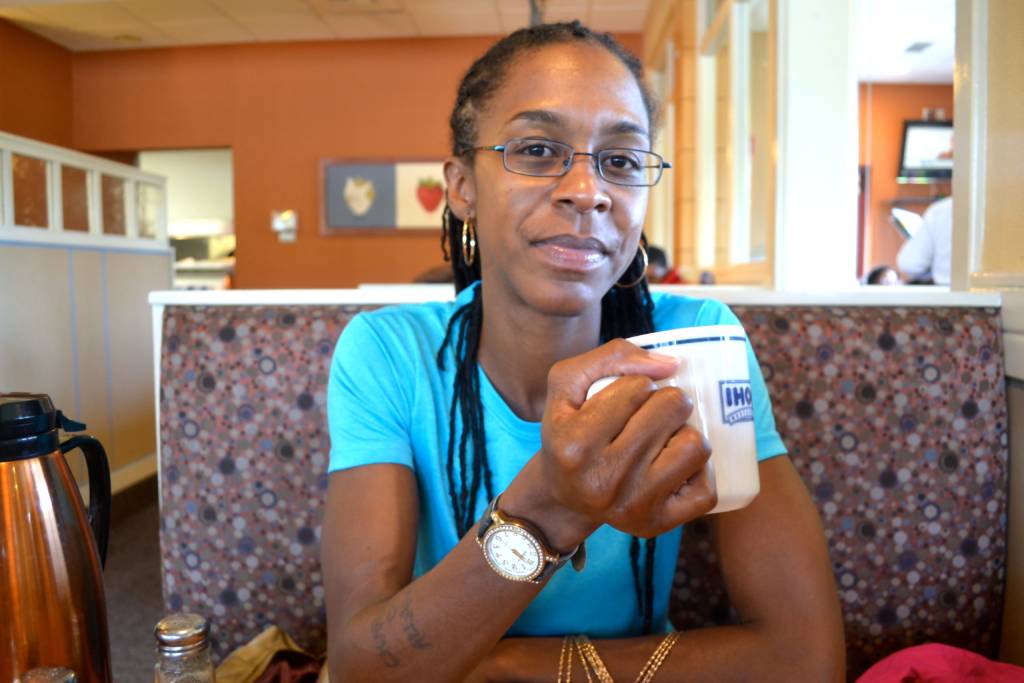Three years after being released from prison, Lashonia Etheridge-Bey sat in a booth at a breakfast place, reminiscing on her relationship with her children while she was behind bars. As she gave her menu to the waiter, you could read the names of her children etched forever in ink on her arm: Charnal and Allante.
Rewind to the year 1993. After being found guilty of a double homicide, the young mother, just 19 years old, was given a 20 to 60-year sentence.
The first thing on Lashonia Etheridge-Bey’s mind wasn’t how old she was going to be by the time she got out of prison; it was how old her children would be.
Etheridge-Bey would spend the next 18 years in prison before being granted parole. Her children would grow to young adulthood in the care of others.
Shortly after her sentencing, Etheridge-Bey’s mother, Shirley, took 10 month-old Allante home with her. Charnal, age 3, was in the care of her father.
The wildly popular television series “Orange is the New Black” has inspired conversation and debate about the complexities of life in women’s prison. The show is based upon a memoir titled with the same name by author and former inmate Piper Kerman who recently came to Washington to receive an award and lead a panel discussion sponsored by the Washington-based think tank, The Constitution Project.
While “Orange is the New Black” explores race, gender, poverty, sexuality, discrimination and the workings of the criminal justice system, the emotional impact of the long term separation of mothers and children is only briefly touched on.
In one episode, a young inmate who was pregnant while behind bars began to go into labor. She was taken to the hospital just long enough to deliver the child, but was not able to establish a real connection before she was back at the prison.
For Etheridge-Bey, and many other female inmates, thoughts and worries about absent sons and daughters are constant features of prison life.
For Etheridge-Bey, the first few years of incarceration were the easiest because she was imprisoned locally, and she was able to see her kids whenever their caretakers could bring them by, which was a few times a year.
Time brought her a whirlwind of new challenges, though.
In the fifth year of her prison sentence, Etheridge-Bey was transferred to Danbury Federal Prison in Connecticut, the same facility where Kerman served her sentence. The prison was a five-hour drive from where Etheridge-Bey’s family lived in Southeast Washington. She served the tail end of her sentence at a prison in West Virginia, even farther than Danbury. The mother was unable to see her children except for once a year.
“The hardest part was when they had to leave, ‘cause they had to literally pry my daughter away from me when she was younger. She used to holler and scream,” Etheridge-Bey remembered.
She attributed the split in her family unit to the fact that she was imprisoned far from where she lived. Being able to see her children helped Etheridge-Bey keep in contact with them, but saying goodbye never got easier for her, she said. Though she sent letters to her children often, she didn’t always get responses, so keeping in touch consistently was difficult.
“I think it was kind of deceptive, because when you get visits and you get the phone calls and you do the email letters, you think that you have a relationship. And so when you get home, you have these unrealistic expectations that there’s really something to build on, but that’s kind of superficial in a way,” Etheridge-Bey said.
When the children would celebrate birthdays or other holidays, Etheridge-Bey’s fellow inmates helped her make gifts. Etheridge-Bey would buy a t-shirt from the prison store, and her inmate friends would draw on them so that she could send her kids nice gifts from inside prison. Her former inmate friends she had made during her sentence helped keep the days special for her kids by visiting with them and helping them celebrate on her behalf.
Etheridge-Bey was released on December 13, 2011, and she began trying to mend her relationships with her children. She quickly learned, though, that it was going to be a long process.
“Adult children-mother relationships are already hard, even if you haven’t been away from them. They have their own lives, and they have their own issues,” Etheridge-Bey said.
After her release, Etheridge-Bey knew from her own experiences that she wanted to help incarcerated mothers stay connected to their children. She noticed that many women had trouble reestablishing these connections in the past, so she wanted to change that.
While working with the District’s Office of Returning Citizens Affairs (ORCA), Etheridge-Bey started a nonprofit called Women Involved in Reentry Efforts, or W.I.R.E. The nonprofit helped the children stay linked to their mothers by doing things like sponsoring bus trips for the children to visits with their mothers at the prisons.
Etheridge-Bey has become a voice for many formerly incarcerated women, and she is passionate about keeping mothers connected with their families because she’s been through what many of them are struggling through.
“No woman wants to feel like a stranger to her own children,” Etheridge-Bey said.






